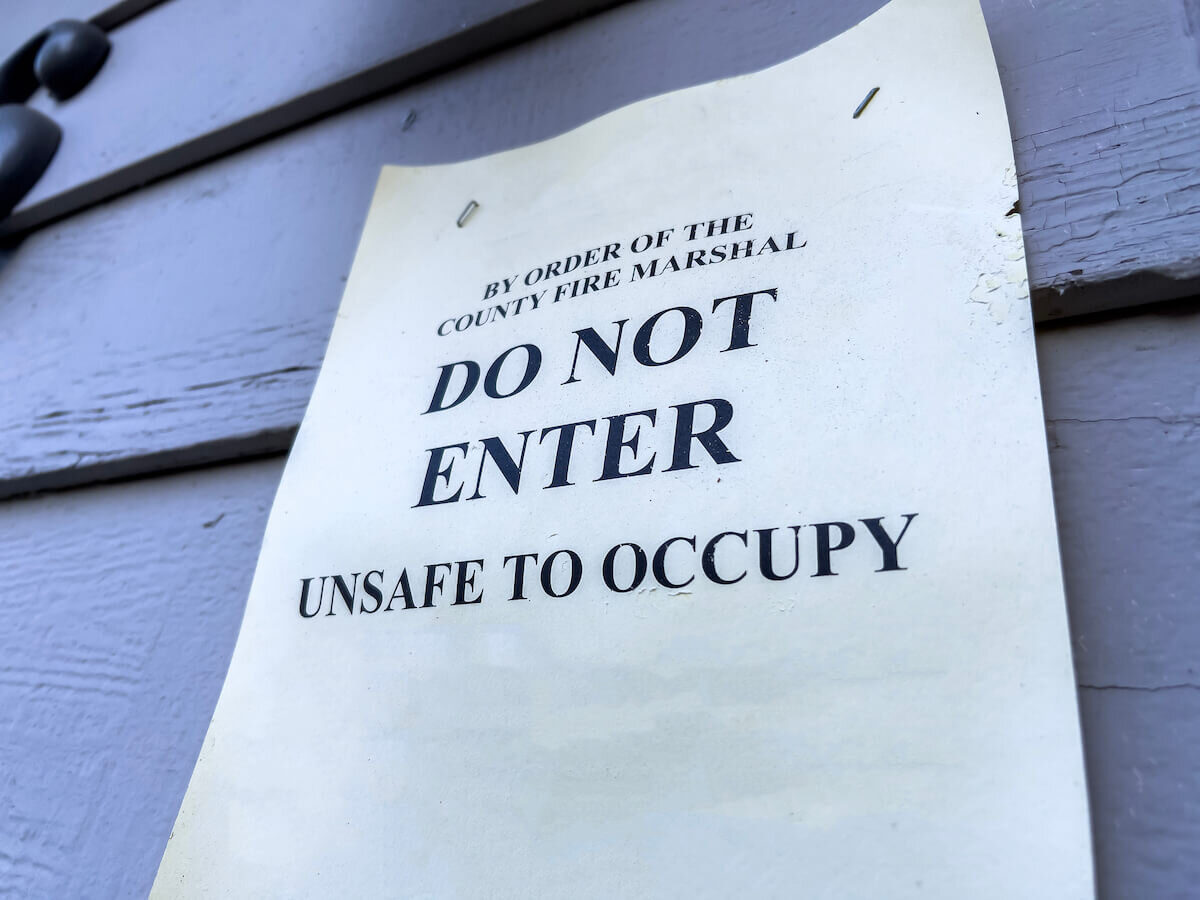 When a house is condemned, it raises many questions. Can the home be sold? Is it safe to live in? What happens when a house is declared condemned? Get the answers to these questions and more by looking at what constitutes grounds for house condemnation, your options for selling a condemned house in Oregon, and the differences between condemned and abandoned houses.
When a house is condemned, it raises many questions. Can the home be sold? Is it safe to live in? What happens when a house is declared condemned? Get the answers to these questions and more by looking at what constitutes grounds for house condemnation, your options for selling a condemned house in Oregon, and the differences between condemned and abandoned houses.
For informational purposes only. Always consult with a licensed real estate professional before proceeding with any real estate transaction.
Get a Cash Offer on Your Home With Cash Is King.
Want to skip the hassle of selling your home? We’ll make you a Guaranteed Cash offer. Get started now for free!
What Are the Grounds for House Condemnation?
A house can be condemned for a variety of reasons, such as dangerous conditions or significant disrepair. This can include structural damage due to fire, earthquake, or other disasters; water damage caused by leaks or flooding; problems with the electrical system such as exposed wires; and mold and pest infestations. Health hazards from lead paint, asbestos insulation, or sewage contamination are also grounds for condemnation. Other issues that could result in a house being condemned might include overcrowding, improper sanitation facilities, blocked access to exits, and other safety concerns. In some cases, even a lack of basic amenities like running water may be grounds for condemnation.
In most areas of the United States, city governments have the authority to issue orders of condemnation when necessary. The goal is usually not just to protect public health and safety but also to help preserve neighborhoods and property values by ensuring adequate living standards are met throughout a community.
It’s important for homeowners facing possible condemnation to address any relevant issues before they become too serious. Homeowners generally get 30–60 days’ notice before their property is officially condemned, but in the case of imminent danger to surrounding houses, such as if the structure is in danger of collapse, demolition might proceed immediately.
In some cases, even habitable properties may be condemned. The local government may want the land a property sits on, whether or not the property is inhabited, for use in a public works project such as a highway, airport, school, etc. The local government is then legally allowed to condemn the property through eminent domain, so long as they compensate the property owners.
What Happens When a House is Declared Condemned?
Once a house is declared as condemned, the situation can become very complicated. There are several steps that must be taken in order to ensure the safety of both the property and its inhabitants. Here’s what happens when a home is condemned:
- The local government becomes aware that a property is in poor condition, generally through someone reporting the property. They send an inspector to confirm the home’s condition.
- The local government will issue a notice to the property owner that the property violates health and safety codes.
- The owner is given some time to improve the property’s condition—it can take a year or more to officially condemn a house. If the owner doesn’t enact repairs, the matter is taken to court, and during the legal hearing, the property is declared officially condemned.
- The property owner is given a period, typically 30–60 days, to vacate the property, enact repairs, request a re-inspection, and apply for the condemned status to be removed.
- If the property owner fails to rehabilitate the property, the property is declared uninhabitable and is demolished at the owner’s expense.
- If the property is deemed habitable after the repairs, inhabitants are legally allowed to move back in.
The process of condemning a house can last a significant amount of time depending on why it’s being condemned. However, if the situation is imminently dangerous—such as cases of toxic mold or structural instability—eviction of inhabitants may happen immediately.
Can You Sell a Condemned House in Oregon?
If you’re the owner of a condemned property, it’s likely you’ll be asking yourself whether you can legally sell it. Unfortunately, you can’t sell a condemned property as a house. It’s considered uninhabitable, so the new owner can’t live in it.
But all isn’t lost, and you can still get some money back from your property. You can generally sell a condemned property as land. Either you can raze the structure yourself, or you can find a cash investor and leave the structure’s fate up to the buyer.
Alternatively, you can put in the work to make the structure inhabitable again. Once the condemned status is removed, you can sell it like you would any other house.
If your property was condemned through eminent domain, you won’t be able to sell it in any capacity, but the government is responsible for providing you compensation in accordance with the home’s appraised value. You’re allowed to dispute the appraised value if you think it’s incorrect—this will typically go to court, so be sure to seek legal counsel.
Removing the Condemned Status
You can remove the condemned status by repairing the property and getting it re-inspected. To do so, you will need to:
- Make all necessary repairs according to code requirements and any other stipulations in the condemnation notice
- Have the property re-inspected by a licensed professional
- Apply to have the condemnation removed
Once all of these steps have been completed, your property should no longer be considered condemned, allowing you to move forward with selling it.
However, this option is likely to be quite expensive, as the issues that can get a home condemned are no small matter. In some cases, the cost to repair the property may be more expensive than starting over from scratch. Be sure to carefully weigh your options if you’re considering repairing a condemned property.
Demolishing the Building and Selling as Land
Demolishing the building and selling the property as land may be an option if you don’t have the resources to repair the house, or if repairs are too costly to make financial sense. Demolition can typically be accomplished quickly, allowing for the sale of the property as soon as possible.
The advantage of this approach is that it allows you to capitalize on the land value, without having to fund costly renovations or maintenance. However, demolition costs should also be taken into account when assessing potential profits from selling the property. The demolition costs for a single-family home typically range from $3,000–$25,000. Factors involved include location (urban areas are typically harder to maneuver equipment), labor costs, disposal fees, building size, and more.
If you wish to hire a real estate agent to help you sell your land, be sure to look for an agent that has experience with land sales. These types of transactions have a number of differences from traditional home sales.
Selling a Condemned Property As-Is
Another option is to sell the property as-is, without making any repairs. Your best bet is to sell to an investor—typical home buyers will have difficulty securing a mortgage loan for a condemned property. The investor can then make their own repairs or use the land for another purpose. You’ll probably be selling at a discount due to the property’s condemned status, but you’ll be able to get the condemned property off of your hands and money in your pocket quickly.
Be sure to check the legal requirements to sell a condemned property in your area. In some places, you might not be able to sell a condemned property without demolishing the building or enacting repairs, regardless of whether someone is willing to buy the condemned structure.
Condemned vs. Abandoned
It’s important to note the difference between a condemned and an abandoned house, as they can have different implications for potential buyers. A condemned home is one that has been deemed by local authorities as being uninhabitable due to its violation of building codes or other safety regulations. On the other hand, an abandoned house may be vacant for any number of reasons, such as foreclosure, death of the owner, etc., but remain legally sound and capable of being re-inhabited with some repairs.
However, it’s not unusual for an abandoned property to become a condemned property. Since the property isn’t being maintained, issues gradually arise and compound until the structure isn’t safe to enter. In some areas, a property being abandoned for a set amount of time is automatically grounds for condemnation.
Do You Have a Condemned Property to Sell?
It is possible to sell a condemned house in Oregon, though it can be difficult. Consider the benefits of selling your condemned property to a cash investor willing to buy as-is. You’ll be able to get rid of the responsibility and expense of rehabbing the property and get cash in hand to buy new real estate.
For informational purposes only. Always consult with a licensed real estate professional before proceeding with any real estate transaction.
Get a Cash Offer On Your Home
No Commission. No Hassle. You pick the closing date.
CashIsKing.com works with cash investors on a daily basis and partners with investors who can deliver quick cash offers on properties of all conditions and locations. Why wait? Get a cash offer from an investor today!
Get a Cash Offer
